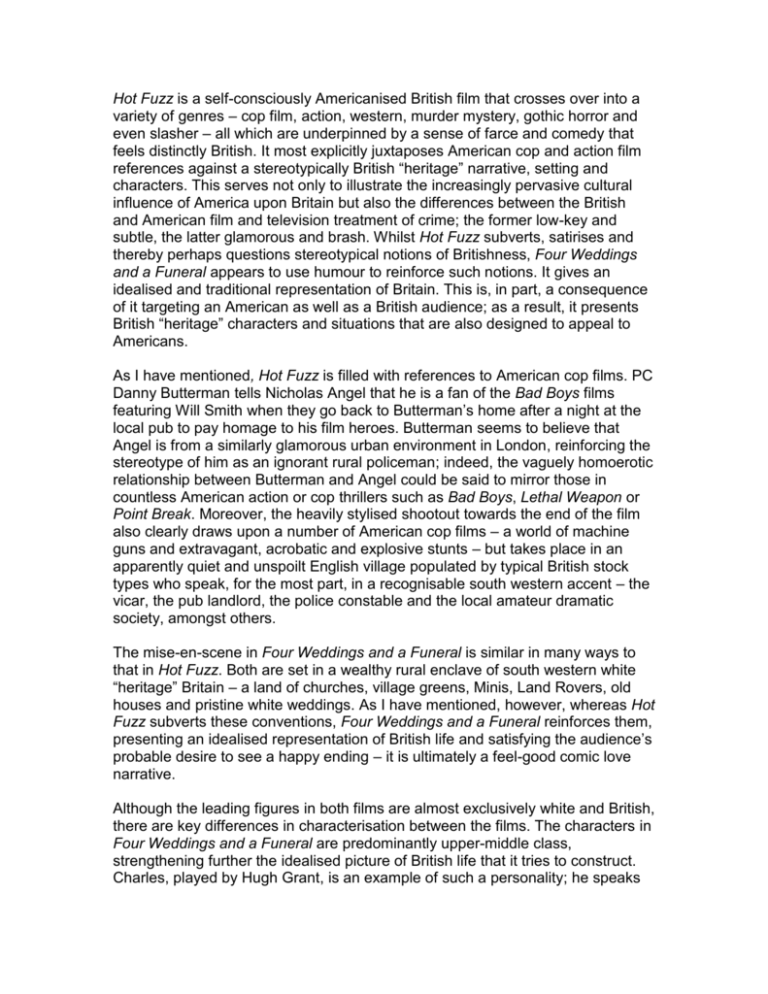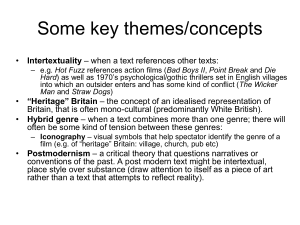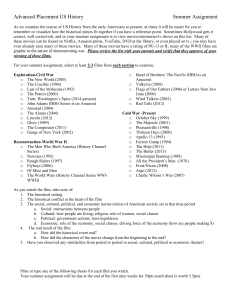Hot Fuzz exemplar essay.doc
advertisement

Hot Fuzz is a self-consciously Americanised British film that crosses over into a variety of genres – cop film, action, western, murder mystery, gothic horror and even slasher – all which are underpinned by a sense of farce and comedy that feels distinctly British. It most explicitly juxtaposes American cop and action film references against a stereotypically British “heritage” narrative, setting and characters. This serves not only to illustrate the increasingly pervasive cultural influence of America upon Britain but also the differences between the British and American film and television treatment of crime; the former low-key and subtle, the latter glamorous and brash. Whilst Hot Fuzz subverts, satirises and thereby perhaps questions stereotypical notions of Britishness, Four Weddings and a Funeral appears to use humour to reinforce such notions. It gives an idealised and traditional representation of Britain. This is, in part, a consequence of it targeting an American as well as a British audience; as a result, it presents British “heritage” characters and situations that are also designed to appeal to Americans. As I have mentioned, Hot Fuzz is filled with references to American cop films. PC Danny Butterman tells Nicholas Angel that he is a fan of the Bad Boys films featuring Will Smith when they go back to Butterman’s home after a night at the local pub to pay homage to his film heroes. Butterman seems to believe that Angel is from a similarly glamorous urban environment in London, reinforcing the stereotype of him as an ignorant rural policeman; indeed, the vaguely homoerotic relationship between Butterman and Angel could be said to mirror those in countless American action or cop thrillers such as Bad Boys, Lethal Weapon or Point Break. Moreover, the heavily stylised shootout towards the end of the film also clearly draws upon a number of American cop films – a world of machine guns and extravagant, acrobatic and explosive stunts – but takes place in an apparently quiet and unspoilt English village populated by typical British stock types who speak, for the most part, in a recognisable south western accent – the vicar, the pub landlord, the police constable and the local amateur dramatic society, amongst others. The mise-en-scene in Four Weddings and a Funeral is similar in many ways to that in Hot Fuzz. Both are set in a wealthy rural enclave of south western white “heritage” Britain – a land of churches, village greens, Minis, Land Rovers, old houses and pristine white weddings. As I have mentioned, however, whereas Hot Fuzz subverts these conventions, Four Weddings and a Funeral reinforces them, presenting an idealised representation of British life and satisfying the audience’s probable desire to see a happy ending – it is ultimately a feel-good comic love narrative. Although the leading figures in both films are almost exclusively white and British, there are key differences in characterisation between the films. The characters in Four Weddings and a Funeral are predominantly upper-middle class, strengthening further the idealised picture of British life that it tries to construct. Charles, played by Hugh Grant, is an example of such a personality; he speaks with a received pronunciation accent, is floppy haired, eccentric, erratic and prone to making embarrassing mistakes but has an underlying charm and confidence and a dry, self-deprecating sense of humour. His best man’s speech at the wedding towards the start of the film is an instance of this type of characteristically “British” humour; he jokingly suggests he may have cursed the marriage of a friend he was previously best man to and begins to mischievously tell the story of the Groom’s unfortunate and obviously fictional sexual experience with some sheep. An exception in the film is the character of Carrie, played by the well-known American actress Andie MacDowell – an indication, perhaps, of the director’s desire to appeal to an American audience with a recognisable face. In contrast, those characters in Hot Fuzz – generally people from traditional rural working or middle class jobs – are arguably more broadly representative of the area they come from.








